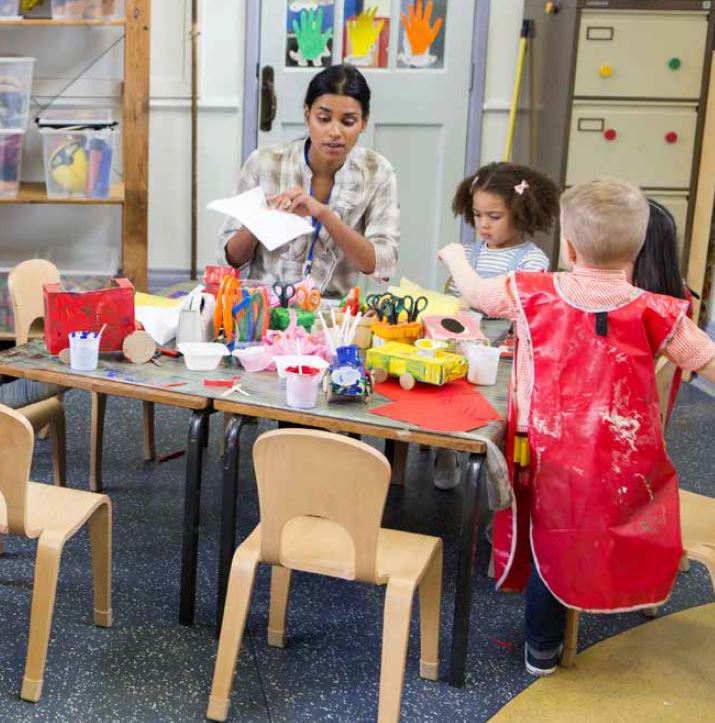New research by the U.S. Chamber of Commerce Foundation and The Education Trust finds compounding inequities magnify challenges for female child care providers of color
Washington, D.C.—The U.S. Chamber of Commerce Foundation and The Education Trust today released a report, “Equity in Child Care is Everyone’s Business,” sharing insights from Black and Latina child care providers about how their work has been affected by the COVID-19 pandemic. The report, along with an accompanying policy brief, “Supporting Young Learners by Supporting Child Care Providers,” are available here.
The report highlights a range of challenges reported by early education professionals — from accessing COVID-related financial and health resources to racial inequalities that undermine their full participation in the business community.
Representing several months of research and interviews with state, regional, and local chambers of commerce as well as child care providers in urban, suburban, and rural areas across the country, “Equity in Child Care is Everyone’s Business” also outlines ways in which leaders at state and local chambers of commerce can support these businesses, which play a crucial role in local economies and support millions of working parents and their children.
“While the pandemic and economic downturn have had repercussions for everyone in child care, they have hit female child care providers of color especially hard,” said Cheryl Oldham, senior vice president of the U.S. Chamber of Commerce Foundation. “This report helps put a human face on the troubling data we’re seeing within the child care industry — and illuminates the opportunities for state and local chambers to help ensure that these often-overlooked businesses not only survive but thrive.”
The report notes that 94 percent of child care workers are female, and 40 percent are people of color, and looks at how these child care workers are heavily impacted by racial inequalities and sexism — including pointing out inequities exacerbated by the pandemic. Black child care providers earn an average of 78 cents less per hour than their White counterparts, even when controlling for education level. While paycheck protection program loans could have eased some of the burden on child care providers, White business owners were approved for Paycheck Protection Program funds at almost twice the rate of Latino business owners.
“Early care and education take place during one of the most crucial times in a child’s development and supporting the female child care workers of color doing so much of this work is critical for families, for the economy, and for our nation as a whole,” said Carrie Gillispie, Ed.D., senior research associate at The Education Trust. “Stronger connections between chambers of commerce and child care providers have the potential to address long-standing as well as pandemic-driven inequities, benefiting entire communities in the process.”
Key findings from the study include:
- Hiring and retaining high-quality staff has become especially difficult during the pandemic. Providers noted particularly high turnover as current and potential staff consider low industry wages, lack of professional development opportunities, and health concerns.
- Stress and strain are leading some providers to leave the workforce. Providers described significant physical and mental strain from working during the pandemic—some of it caused by racism and sexism, isolation from social connections, and an overall lack of emotional support.
- There is a disconnect between child care supply and demand; many providers’ enrollments have changed significantly. The pandemic has introduced a new layer of uncertainty to child care enrollment and has affected child care providers differently, with some able to sustain or rebuild their pre-pandemic enrollment levels, and others still struggling to maintain sufficient enrollment to stay open. As child care programs were forced to close, some permanently, working parents—particularly women, parents of color, and parents who cannot work from home—struggled to find alternative child care, and some had to leave the workforce as a result. Providers noted that there is inconsistent demand for overnight and weekend child care, and they might be better able to support non-traditional work hours if employers jointly requested programs.
- Providers are struggling financially. Rising pandemic-related health and safety costs, coupled with decreased enrollment, have all but erased child care businesses’ already slim profit margins. While the American Rescue Plan provided states with some temporary funding for child care stabilization, including funding for eligible child care providers, sustainable funding and supports are still needed to create the framework necessary for all families to have access to high-quality child care.
- Pandemic safety concerns are a major source of stress. Interviews were conducted before COVID-19 vaccines were available, at a time when many providers wanted to close or remain closed due to COVID-19 safety concerns, yet faced pressure from communities and families to stay open to support those in need of child care. A major challenge cited by those who wanted to remain open was their ability to help parents feel comfortable bringing their children back to child care facilities.
The report, “Equity in Child Care is Everyone’s Business,” along with an accompanying policy brief, “Supporting Young Learners by Supporting Child Care Providers,” are available at https://edtrust.org/resource/equity-in-child-care-is-everyones-business/.
To sign up for updates from the U.S. Chamber Foundation’s work on early childhood, visit uschamberfoundation.org/earlyed. To learn more about The Education Trust’s work on early childhood education, visit edtrust.org/issue/early-childhood-education/
###
About the U.S. Chamber of Commerce Foundation
The U.S. Chamber of Commerce Foundation is dedicated to strengthening America’s long-term competitiveness. We educate the public on the conditions necessary for business and communities to thrive, how business positively impacts communities, and emerging issues and creative solutions that will shape the future.
About The Education Trust
The Education Trust is a national nonprofit that works to close opportunity gaps that disproportionately affect students of color and students from low-income families. Through our research and advocacy, Ed Trust supports efforts that expand excellence and equity in education from preschool through college; increase college access and completion, particularly for historically underserved students; engage diverse communities dedicated to education equity; and increase political and public will to act on equity issues.







